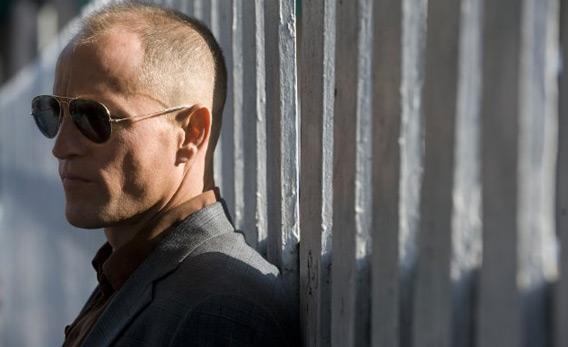With Rampart, the Israeli director Oren Moverman shifts into an idiom that’s more likely to appeal to American audiences than the quiet, downbeat social realism of his first film, The Messenger (2009). The partly-true story of a very bad cop brought down by the LAPD corruption scandals of the late ’90s, Rampart is much louder, jazzier, and more directorially show-offy than The Messenger (and, in part for those reasons, not nearly as good a movie). But at times this gritty, intermittently gripping police drama feels like a follow-up to The Messenger—not just because of the thematic overlap (both films deal with grief, substance abuse, and self-destructive masculinity), but because Rampart’s main character, the cynical, drug-abusing cop played by Woody Harrelson, might be the long-lost twin of the alcoholic Army captain Harrelson played in the earlier Moverman film.
Harrelson’s characters in both films share an almost preening pride in their own hard-charging nastiness, rarely missing out on the opportunity to display their lack of empathy to others. In the case of Rampart’s Dave Brown, though, this quality is less forgivable. Harrelson’s character in The Messenger had to make his living telling military families that their loved ones were dead, and Moverman’s film was all about how that job drains those who do it of their ability to feel. “Date-Rape Dave,” on the other hand—so nicknamed because of a long-ago case in which he shot a serial date rapist with questionable cause—seems to have been born bad. He plants evidence and beats up suspects. He lies to police investigators with a barely concealed smirk. He shakes down pharmacists for drugs. Like Denzel Washington’s character in Training Day or Harvey Keitel’s in Bad Lieutenant, Dave Brown is a citizen’s nightmare of just how evil a law enforcement officer could conceivably get.
Dave does fiercely love his two daughters, but his parenting is as slipshod as his policing, and his older daughter, a budding gender-studies theorist (stone-faced, note-perfect Brie Larson) already holds him in open contempt. Dave’s living arrangements are unusual: His girls’ mothers (Cynthia Nixon and Anne Heche) are sisters, both of whom were once married to Dave, and who now live with him and their children in a Big Love-style two-family compound. This household would be fairly harmonious if it weren’t for Dave’s propensity for disappearing on long benders and picking up whoever will take him home for the night—including a bar-hopping lawyer (Robin Wright) with whom he forms an uneasy romantic bond.
With the Rampart division of the LAPD under investigation for corruption, the flinty assistant D.A. (Sigourney Weaver) pressures Dave to take an early-retirement deal and avoid prosecution, but he defiantly insists that he’s not even the worst cop in his unit (a claim the viewer can only pray is false). On the advice of his old buddy Hartshorn (Ned Beatty), a retired cop with even more lucrative gangland connections, Dave decides to hold up an ongoing high-stakes card game in a scheme that goes spectacularly awry.
Moverman is a gifted director of actors—every tiny role here is cast with an actor who makes something of it, from Weaver to Beatty to Steve Buscemi (as a shifty-eyed mayor) to Ice Cube (as an internal-affairs investigator bent on taking down Date-Rape Dave). And the director found the right muse in Harrelson, who at 50 has reached an unexpected high point in his career; in The Messenger and here, he’s as good as he’s ever been. There were a few years there where it seemed like Woody Harrelson would only ever get to play variations on the benign stoner doofus or the gonzo comic villain. But Dave Brown is a genuinely complex character—more complex, at times, than the movie he appears in (which was written by Moverman with the L.A. crime novelist James Ellroy and filmed in stylishly oversaturated color by Bobby Bukowski). Though he seems incapable of performing a single commendable action, Dave is no moral monster. Harrelson lets us see how, in this character’s twisted value system, his psychopathic behavior constitutes honorable loyalty to a personal warrior code.
The last third of Rampart founders in disappointingly standard-issue abjection: binges in hotel rooms, visits to nightclubs rendered in freaky drug-cam. And throughout the film, the scenes that take place between Dave and his fellow cops feel overdrawn and manipulative—in order to believe that he’s sexist, do we really have to watch him force a female subordinate to choke down an order of French fries she doesn’t want? But when Dave is with the women in his life—his two sister-wives, their daughters, and the poor deluded bar pickups who fall for his toxic combination of need and threat—Rampart can be perceptive and powerful. There are some late scenes between Harrelson and Larson that play like outtakes from a different, better film, one that that dares to drop the dissolute L.A.-noir pose and pay attention to all that’s going on in a simple conversation between a seriously messed-up father and his estranged daughter: disappointment, betrayal, love. I hope that’s the kind of movie Oren Moverman will make next.
